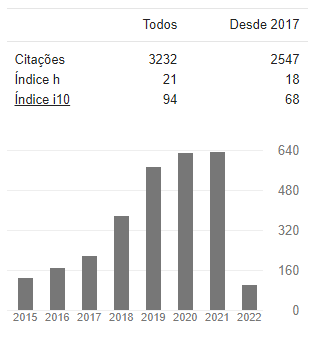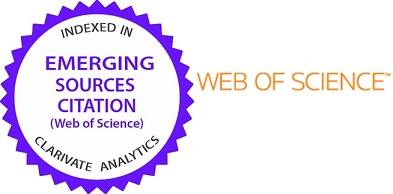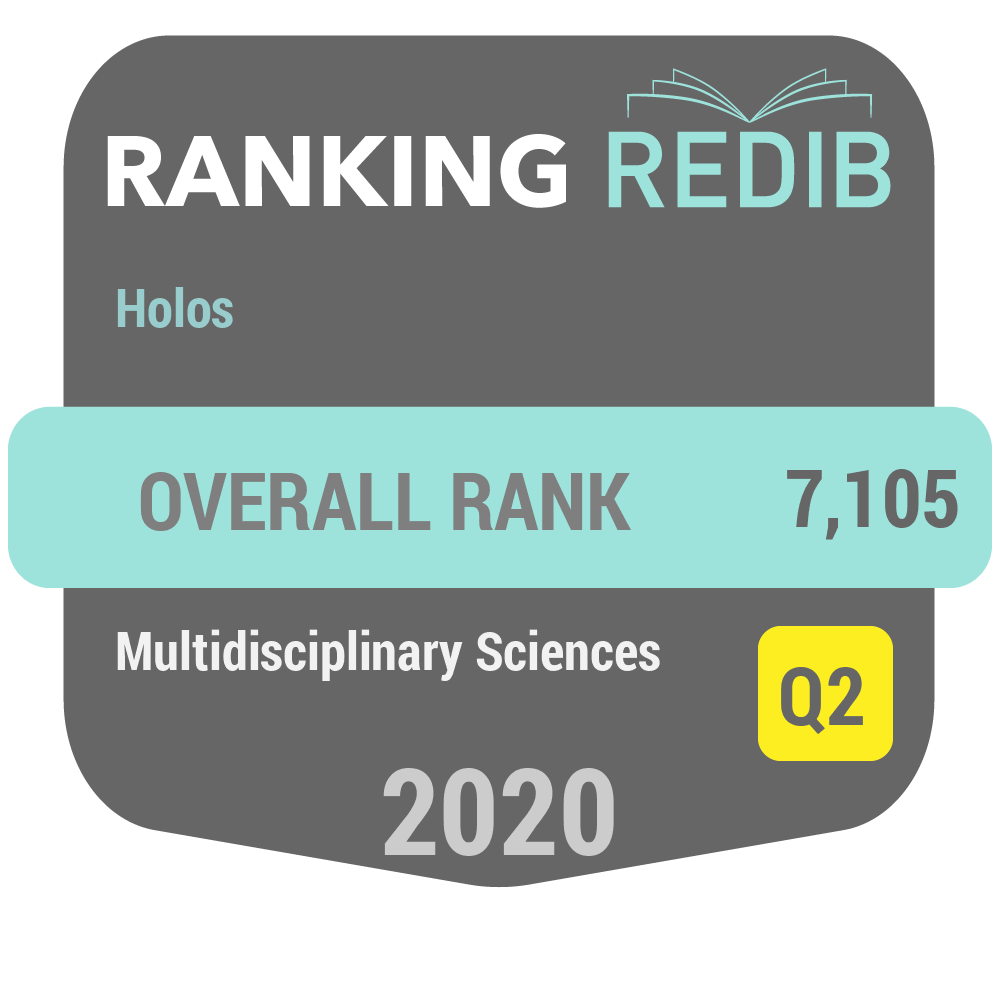The impact of social entrepreneurial personality on Social entrepreneurial intention among university graduates in Yemen: A conceptual Framework
DOI:
https://doi.org/10.15628/holos.2021.11420Resumo
The need for social entrepreneurship today is highly emphasized as a fast and efficient tool to address the complex socio-economic and humanitarian crises that today's world is plagued more than ever in history. Nevertheless, there has been few research on the underlying factors, individuals' intention to create a new social enterprise, especially in at least developing countries like Yemen. Therefore, this study aims to fulfill this gap by proposing a conceptual framework on how social entrepreneurial intention can be among university graduates. It seeks particularly to examine the combined effect of classical entrepreneurial orientation and prosocial orientation as elements of social entrepreneurial personality on social entrepreneurial intention.This framework could be useful for universities and other stakeholders to produce graduates with holistic social entrepreneurship traits that guide them to choose social entrepreneurship as a viable career path. Pursuing a career in businesses with social aim graduates will have high potential in transforming from job seekers to opportunity generators, thereby bridging the existing gab in social needs.
Downloads
Referências
ABAHO, E., BEGUMISA, D. B., AIKIRIZA, F. & TURYASINGURA, I. 2017. ENTREPRENEURIAL ORIENTATION AMONG SOCIAL ENTERPRISES IN UGANDA. Business Management Review, 20, 1-14.
AL-KHALQI, N. F. 2017. Social Entrepreneurship in Yemen: A Yemeni Youth Perspective. Ohio University.
ALARIFI, G., ROBSON, P. & KROMIDHA, E. 2019. The manifestation of entrepreneurial orientation in the social entrepreneurship context. Journal of Social Entrepreneurship, 1-21.
ASANTE, E. A., AFFUM-OSEI, E. & DANQUAH, B. 2020. Aspiring to Be a Social Entrepreneur: Does Prosocial Motivation Matter? Social Entrepreneurship and Corporate Social Responsibility. Springer.
BACQ, S. & JANSSEN, F. 2011. The multiple faces of social entrepreneurship: A review of definitional issues based on geographical and thematic criteria. Entrepreneurship & Regional Development, 23, 373-403.
BARGSTED, M., PICON, M., SALAZAR, A. & ROJAS, Y. 2013. Psychosocial Characterization of Social Entrepreneurs: A Comparative Study. Journal of Social Entrepreneurship, 4, 331-346.
BAZAN, C., GAULTOIS, H., SHAIKH, A., GILLESPIE, K., FREDERICK, S., AMJAD, A., YAP, S., FINN, C., RAYNER, J. & BELAL, N. 2020. Effect of the university on the social entrepreneurial intention of students. New England Journal of Entrepreneurship.
BEGLEY, T. M. 1995. Using founder status, age of firm, and company growth rate as the basis for distinguishing entrepreneurs from managers of smaller businesses. Journal of business venturing, 10, 249-263.
BESLEY, T. & GHATAK, M. 2017. Profit with purpose? A theory of social enterprise. American Economic Journal: Economic Policy, 9, 19-58.
BIERHOFF, H.-W. 2002. 11. Just World, Social Responsibility, and Helping Behavior. The justice motive in everyday life, 189.
BORMAN, W. C., PENNER, L. A., ALLEN, T. D. & MOTOWIDLO, S. J. 2001. Personality predictors of citizenship performance. International journal of selection and assessment, 9, 52-69.
CAIRD, S. 1991. Testing enterprising tendency in occupational groups. British Journal of Management, 2, 177-186.
CAVAZOS-ARROYO, J., PUENTE-DÍAZ, R. & AGARWAL, N. 2017. An examination of certain antecedents of social entrepreneurial intentions among Mexico residentes. Review of Business Management, 19, 180-218.
CHANDRA, Y. & PARAS, A. 2020. Social entrepreneurship in the context of disaster recovery: Organizing for public value creation. Public Management Review, 1-22.
CHELL, E., SPENCE, L. J., PERRINI, F. & HARRIS, J. D. 2016. Social entrepreneurship and business ethics: Does social equal ethical? Journal of business ethics, 133, 619-625.
CHIPETA, E. M. 2015. Social entrepreneurship intentions among university students in Gauteng.
CHIPETA, E. M. 2019. Antecedents of social entrepreneurial intentions among Generation Y university students in South Africa. North-West University.
CHIPETA, E. M. & SURUJLAL, J. 2017. Influence of Attitude, Risk Taking Propensity and Proactive Personality on Social Entrepreneurship Intentions. Polish Journal of Management Studies, 15, 27-36.
CHOI, S., KIM, N. & KIM, W. 2019. Are social entrepreneurs more risk-averse? Applied Economics Letters, 26, 933-937.
DEES, J. G. 1998. The Meaning of Social Entrepreneurship. Case studies in social entrepreneurship and sustainability. Routledge.
DEES, J. G. 2012. A tale of two cultures: Charity, problem solving, and the future of social entrepreneurship. Journal of business ethics, 111, 321-334.
DOUGLAS, E. & PRENTICE, C. 2019. Innovation and profit motivations for social entrepreneurship: A fuzzy-set analysis. Journal of Business Research, 99, 69-79.
EISENBERG, N., FABES, R. A. & SPINRAD, T. 2006. Handbook of child psychology, John Wiley & Sons.
ELLIOTT, R. M. 2019. Social entrepreneurship as a catalyst to break the poverty trap: An analysis of the motivational factors in South Africa. Acta Commercii, 19, 13.
ERNST, K. 2011. Heart over mind–An empirical analysis of social entrepreneurial intention formation on the basis of the theory of planned behaviour. Universität Wuppertal, Fakultät für Wirtschaftswissenschaft/Schumpeter ….
ERNST, K. 2012. Social entrepreneurs and their personality. Social entrepreneurship and social business. Springer.
FAYOLLE, A. & LIÑÁN, F. 2014. The future of research on entrepreneurial intentions. Journal of Business Research, 67, 663-666.
FORSTER, F. & GRICHNIK, D. 2013. Social entrepreneurial intention formation of corporate volunteers. Journal of Social Entrepreneurship, 4, 153-181.
GHALWASH, S., TOLBA, A. & ISMAIL, A. 2017. What motivates social entrepreneurs to start social ventures? An exploratory study in the context of a developing economy. Social Enterprise Journal, 13, 268-298.
GUCLU, A., DEES, J. G. & ANDERSON, B. B. 2002. The process of social entrepreneurship: Creating opportunities worthy of serious pursuit. Center for the advancement of Social Entrepreneurship, 1, 1-15.
GUPTA, V. K. & BHAWE, N. M. 2007. The influence of proactive personality and stereotype threat on women's entrepreneurial intentions. Journal of Leadership & Organizational Studies, 13, 73-85.
HAUGH, H. 2007. New strategies for a sustainable society: The growing contribution of social entrepreneurship. Business Ethics Quarterly, 17, 743-749.
HEMINGWAY, C. A. 2005. Personal values as a catalyst for corporate social entrepreneurship. Journal of business ethics, 60, 233-249.
HOCKERTS, K. 2017. Determinants of Social Entrepreneurial Intentions. Entrepreneurship Theory and Practice, 41, 105-130.
IBP 2013. Yemen Country Study Guide: Volume 1 Strategic Information and Developments. International Business Publications, USA.
KIM, A., MOON, C. W., KIM, S. K., KOH, Y. S. & SHIN, J. 2019. An Empirical Investigation on the Psychological Antecedents of Social Entrepreneurship. Entrepreneurship Research Journal.
KIRUKI, L. 2016. The Relationship between Entrepreneurial Orientation and Performance of Social Enterprises in Kenya. United States International University-Africa.
KOE, W.-L. 2016. The relationship between Individual Entrepreneurial Orientation (IEO) and entrepreneurial intention. Journal of Global Entrepreneurship Research, 6, 13.
KRUEGER, N. F. 2007. The cognitive infrastructure of opportunity emergence. Entrepreneurship. Springer.
LANGKAMP BOLTON, D. & LANE, M. D. 2012. Individual entrepreneurial orientation: development of a measurement instrument. Education + Training, 54, 219-233.
LEADBEATER, C. 1997. The rise of the social entrepreneur, Demos.
LIGHT, P. C. Searching for social entrepreneurs: Who they might be, where they might be found, what they do. Draft presented at the Conference of the Association for Research on Nonprofit and Voluntary Organizations, November, 2005. 17-19.
LUC, P. T. 2020. The influence of personality traits on social entrepreneurial intention among owners of civil society organisations in Vietnam. International Journal of Entrepreneurship and Small Business, 40, 291-308.
LURTZ, K. & KREUTZER, K. 2017. Entrepreneurial orientation and social venture creation in nonprofit organizations: The pivotal role of social risk taking and collaboration. Nonprofit and Voluntary Sector Quarterly, 46, 92-115.
MA, Y. J., KIM, M. J., HEO, J. S. & JANG, L. J. The effects entrepreneurship and market orientation on social performance of social enterprise. Int Conf Econ Market Manager, 2012. 60-65.
MAIR, J. & MARTI, I. 2006. Social entrepreneurship research: A source of explanation, prediction, and delight. Journal of world business, 41, 36-44.
MAIR, J. & NOBOA, E. 2003. Social entrepreneurship: How intentions to create a social enterprise get formed.
MEDYANIK, O. & AL-JAWNI, F. 2017. An investigation of students’ social entrepreneurial intentions in Syria: an empirical test. Modernizing Academic Teaching and Research in Business and Economics. Springer.
MILLER, D. 2011. Miller (1983) revisited: A reflection on EO research and some suggestions for the future. Entrepreneurship Theory and Practice, 35, 873-894.
MILLER, T. L., GRIMES, M. G., MCMULLEN, J. S. & VOGUS, T. J. 2012. Venturing for others with heart and head: How compassion encourages social entrepreneurship. Academy of management review, 37, 616-640.
MORRIS, M. H., WEBB, J. W. & FRANKLIN, R. J. 2011. Understanding the manifestation of entrepreneurial orientation in the nonprofit context. Entrepreneurship theory and practice, 35, 947-971.
MWIYA, B. M. K. 2014. The impact of entrepreneurship education on the relationships between institutional and individual factors and entrepreneurial intention of university graduates: Evidence from Zambia.
NASSER, A. 2018. Beyond the Business as Usual Approach: Private Sector Engagment in Postconflict Yemen - Rethinking Yemen’s Economy Sana’a Center for Strategic Studies, Haddah Street, Sana’a, Yemen.
NICOLÁS, C., RUBIO, A. & FERNÁNDEZ-LAVIADA, A. 2018. Cognitive Determinants of Social Entrepreneurship: Variations According to the Degree of Economic Development. Journal of Social Entrepreneurship, 9, 154-168.
PAK, A., ADEGBOYE, O. A., ADEKUNLE, A. I., RAHMAN, K. M., MCBRYDE, E. S. & EISEN, D. P. 2020. Economic consequences of the COVID-19 outbreak: the need for epidemic preparedness. Frontiers in public health, 8.
PENNER, L. A., DOVIDIO, J. F., PILIAVIN, J. A. & SCHROEDER, D. A. 2005. Prosocial behavior: Multilevel perspectives. Annu. Rev. Psychol., 56, 365-392.
POMERANTZ, M. 2003. The business of social entrepreneurship in a" down economy". IN BUSINESS-EMMAUS PENNSYLVANIA-, 25, 25-28.
PORTALES, L. 2019. Social Innovation and Social Entrepreneurship: Fundamentals, Concepts, and Tools, Springer.
PRIETO, L. C. 2010. The influence of proactive personality on social entrepreneurial intentions among African American and Hispanic undergraduate students: The moderating role of hope.
RAHMAN, R. S. A. R. & PIHIE, Z. A. L. Validity and reliability of the social entrepreneurial personality. European Conference on Management, Leadership & Governance, 2014. Academic Conferences International Limited, 506.
RAUCH, A. & FRESE, M. 2007. Let's put the person back into entrepreneurship research: A meta-analysis on the relationship between business owners' personality traits, business creation, and success. European Journal of work and organizational psychology, 16, 353-385.
RAUCH, A., WIKLUND, J., LUMPKIN, G. T. & FRESE, M. 2009. Entrepreneurial orientation and business performance: An assessment of past research and suggestions for the future. Entrepreneurship theory and practice, 33, 761-787.
SAEBI, T., FOSS, N. J. & LINDER, S. 2018. Social Entrepreneurship Research: Past Achievements and Future Promises. Journal of Management, 45, 70-95.
SANA’A CENTER FOR STRATEGIC STUDIES, CONSULTING, D., WITH, C. F. A. R. I. P. & ORIENT, T. 2018. GENERATING NEW EMPLOYMENT OPPORTUNITIES IN YEMEN-Rethinking Yemen’s Economy
SATAR, M. S. & NATASHA, S. 2019. Individual social entrepreneurship orientation: towards development of a measurement scale. Asia Pacific Journal of Innovation and Entrepreneurship.
SECCHI, D. 2009. The cognitive side of social responsibility. Journal of business ethics, 88, 565-581.
SILATECH INDEX RANKINGS 2013. Volunteerism linked to entrepreneurship Among Young Arabs.
SIMMS, S. & ROBINSON, J. Activist or entrepreneur. An identity-based model of social entrepreneurship. Presentation. to 2 nd International Social Entrepreneurship Research Conference, NYU, 2006.
SSERWANGA, A., KICONCO, R. I., NYSTRAND, M. & MINDRA, R. 2014. Social entrepreneurship and post conflict recovery in Uganda. Journal of Enterprising Communities: People and Places in the Global Economy.
STEPHAN, U. & DRENCHEVA, A. 2017. The person in social entrepreneurship: A systematic review of research on the social entrepreneurial personality. The Wiley handbook of entrepreneurship, 205-229.
SULPHEY, M. & SALIM, A. 2020. Development of a tool to measure social entrepreneurial orientation. Journal of Entrepreneurship in Emerging Economies.
TAN, L. P., LE, A. N. H. & XUAN, L. P. 2019. A Systematic Literature Review on Social Entrepreneurial Intention. Journal of Social Entrepreneurship, 1-16.
TAN, W. L. 2010. Nonprofit Organisations and Social Entrepreneurship Intentions.
TEISE, H. & URBAN, B. 2015. Antecedents to social entrepreneurship intentions: An empirical study in South Africa. Management Dynamics: Journal of the Southern African Institute for Management Scientists, 24, 36-52.
TRAN, A. Factors Influencing Social Entrepreneurial Intention: A Theoretical Model. Proceedings of ISERD 89th International Conference, 2017. 51-57.
TRAN, A. T. & VON KORFLESCH, H. 2016. A conceptual model of social entrepreneurial intention based on the social cognitive career theory. Asia Pacific Journal of Innovation and Entrepreneurship.
UNOCHA 2019. Humanitarian Needs Overview, Yemen.
VALLE, M. A. P., FUCHS, R. M., SÁENZ, M., NGA, J. K., DARMOHRAJ, A. & MOSCHETTI, M. 2018. Personality traits and social entrepreneurship dimensions in Peru and Argentina. COMPENDIUM: Cuadernos de Economía y Administración, 5, 32-57.
WAHID, S., AYOB, A., HUSSAIN, W. W. & ISMAIL, S. 2018. Social entrepreneurship intention: from literature review to Conceptual framework. Journal of Fundamental and Applied Sciences, 10, 1242-1260.
WEERAWARDENA, J. & MORT, G. S. 2006. Investigating social entrepreneurship: A multidimensional model. Journal of world business, 41, 21-35.
WOOD, S. 2012. Prone to progress: Using personality to identify supporters of innovative social entrepreneurship. Journal of Public Policy & Marketing, 31, 129-141.
WORLD BANK. 2019. Yemen Overview [Online]. Available: https://www.worldbank.org/en/country/yemen/overview [Accessed].
ZAHRA, S. A., GEDAJLOVIC, E., NEUBAUM, D. O. & SHULMAN, J. M. 2009. A typology of social entrepreneurs: Motives, search processes and ethical challenges. Journal of Business Venturing, 24, 519-532.
ZAHRA, S. A., NEWEY, L. R. & LI, Y. 2014. On the frontiers: The implications of social entrepreneurship for international entrepreneurship. Entrepreneurship Theory and Practice, 38, 137-158.









































